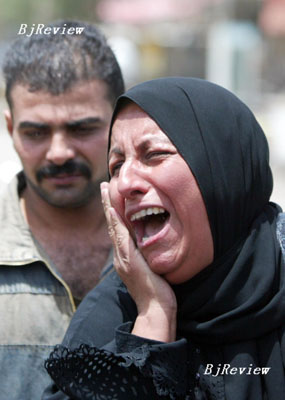
Four years after Saddam Hussein’s administration was torn down, the security issue remains a chronic illness for Iraq, which is torturing both the
Iraqi and U.S. governments.
When the Iraq war began, the U.S. administration promised freedom and democracy to the Iraqi people. Today, that promise has turned into a nightmare for U.S. President George W. Bush, because of worsening security in Iraq and rising U.S. casualties. Although the international community is trying to resolve Iraq’s security and reconstruction problems, finding a way in the near future looks unlikely.
International Compact for Iraq
As early as May 2006, Iraqi Prime Minister Nouri al-Maliki applied to the United Nations (UN), hoping to establish an international dialogue aimed at supporting Iraq’s reconstruction, which would be attended by representatives of the international community. His suggestion was supported by both the UN and the U.S. Government.
The UN and the Iraqi Government jointly created a reconstruction plan on July 27, 2006, known as the International Compact, to develop the political, economic and social fields in Iraq over five years. According to the plan, a permanent partnership between Iraq and the international community will be set up.
On March 16, the UN held an international conference on aiding Iraq at its New York headquarters, which representatives from more than 90 countries and regions attended. In his speech at the conference, UN Secretary General Ban Ki-moon noted that the International Compact with Iraq (ICI) was aiming at establishing an interactive relationship between Iraq and the rest of the world.
A ministerial meeting of the ICI came to an end at the Egyptian resort of Sharm el-Sheikh on May 3, with participants from more than 60 states and 12 regional and international organizations in attendance. Egyptian Foreign Minister Ahmed Aboul Gheit said at the conference that political pacification inside Iraq is the crucial element to resolve Iraq’s problems, and military action is not the solution. Peaceful coexistence between Iraq’s ethnic and religious groups is the basis of guaranteeing a united country and a precondition for promoting economic development and social stability, he said.
Anti-U.S. military groups inside the country have grown in strength as the U.S. counterinsurgency has become tougher. Now, Sunni, Shiite and Al Qaeda affiliated militant groups are the biggest problems for U.S. troops. Collisions between the local militant groups and U.S. troops have worsened the Iraqi security situation since the war.
It is impossible for a handful of conferences to change the security landscape in the country, which has been proved by reality. Baghdad is still bleeding everyday, and rarely do the Iraqi people have a sense of security.
The involved parties reached a common understanding during the May conference that Iraq should not break into separate nations. It is quite possible that the Iraqi issue could be turned into a long running affair like the Israeli-Palestinian dispute. The Iraqi people believe that foreign troops are creating conflicts among ethnic groups and political parties, leading to growing violence.
Generally speaking, the security situation and peaceful coexistence of ethnic groups are the key elements influencing Iraq’s economic reconstruction.
Limited performance of neighborhood
The function of Arabian countries and Iraq’s neighbors during its reconstruction process has been very limited, because almost all the profits created by the war have gone to U.S. companies. The U.S. Government has been cautious on Iran and Syria’s attempts to get involved in the Iraqi issues, accusing them of allowing anti-U.S. militants to pass across their borders into Iraq. Although U.S. experts and officials have suggested that President Bush resolve the Iraqi issues through regional dialogue, there is still a long way to go, because the United States, Iran and Syria still need time to establish mutual trust.
| 